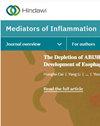墨西哥心肌梗死患者口腔微生物组与三甲胺氧化物定量的潜在联系
IF 4.4
3区 医学
Q2 CELL BIOLOGY
引用次数: 0
摘要
为了评估口腔-肠道-肝脏轴与疾病发生机制之间的联系,人们进行了许多尝试。其中之一是口腔微生物群转移到血液、肝脏和肠道,促进宿主菌群失调,并引发一些代谢物的存在,如三甲胺 N-氧化物(TMAO),它是心血管疾病,尤其是心肌梗塞(MI)的风险标志物。在本试验性研究中,与 TMAO 的存在相关的口腔菌群失调被认为是心肌梗塞发生的标准风险因素(SRs)的一个独立组成部分,这在人类队列中以前从未描述过。我们发现 TMAO 水平与卟啉单胞菌(Porphyromonas)呈明显的正相关;同样,在无 SRs 的患者中也观察到肽杆菌属(Peptidiphaga)的增加。我们确定,SR 的存在不会影响这些患者体内的 TMAO 浓度。本报告是首次在墨西哥人群中明确口腔菌群失调与 TMAO 之间关系的研究。我们的研究结果提供了与肠道菌群失调相关的口腔病原体可能导致 MI 发病的信息,但仍需进行进一步分析。本文章由计算机程序翻译,如有差异,请以英文原文为准。
Potential Association of the Oral Microbiome with Trimethylamine N-Oxide Quantification in Mexican Patients with Myocardial Infarction
Many attempts have been proposed to evaluate the linkage between the oral–gut–liver axis and the mechanisms related to the diseases’ establishment. One of them is the oral microbiota translocation into the bloodstream, liver, and gut, promoting a host dysbiosis and triggering the presence of some metabolites such as trimethylamine N-oxide (TMAO), known as a risk marker for cardiovascular disease, and especially the myocardial infarction (MI). In the present pilot study, the involvement of oral dysbiosis related to the presence of TMAO has been considered an independent component of the standard risk factors (SRs) in the development of MI, which has not been previously described in human cohorts. A positive and significant correlation of TMAO levels with Porphyromonas was identified; likewise, the increase of the genus Peptidiphaga in patients without SRs was observed. We determined that the presence of SRs does not influence the TMAO concentration in these patients. This report is the first study where the relationship between oral dysbiosis and TMAO is specified in the Mexican population. Our findings provide information on the possible contribution of the oral pathogens associated with gut dysbiosis in the development of MI, although further analysis should be performed.
求助全文
通过发布文献求助,成功后即可免费获取论文全文。
去求助
来源期刊

Mediators of Inflammation
医学-免疫学
CiteScore
8.70
自引率
0.00%
发文量
202
审稿时长
4 months
期刊介绍:
Mediators of Inflammation is a peer-reviewed, Open Access journal that publishes original research and review articles on all types of inflammatory mediators, including cytokines, histamine, bradykinin, prostaglandins, leukotrienes, PAF, biological response modifiers and the family of cell adhesion-promoting molecules.
 求助内容:
求助内容: 应助结果提醒方式:
应助结果提醒方式:


